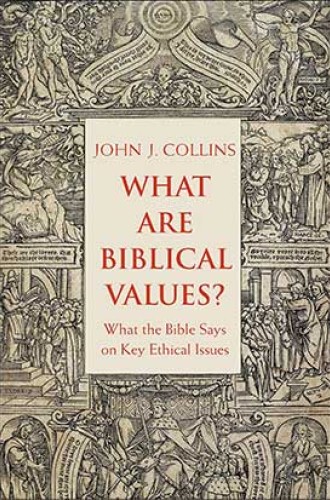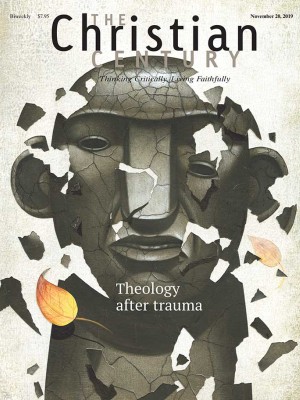What the Bible actually says about abortion, slavery, and other controversial topics
Should scripture inform our ethics? How, and which parts?
Very few members of my congregation are drawn to the Bible like I am. Generally, they articulate feeling lost when it comes to scripture. More often than not, our sacred texts puzzle, disturb, and alienate them. Confirmation students ask what I suspect many adults are also thinking: “Why do we need this book? It was written by old dead guys! It’s boring! It’s homophobic, sexist, and violent!”
What I hear underneath my congregants’ struggle with the Bible is a reluctance to trust their own authority as interpreters. They seem to believe they have only two options: swallow the text—and the flawed readings of it that permeate popular culture—without question, or reject it as useless and offensive. In this sense, they’re the ideal audience for John Collins’s new book.
Read our latest issue or browse back issues.
Collins, who teaches Old Testament at Yale Divinity School, pours a lifetime of scholarship into this study of what the Bible says about controversial ethical topics. It’s highly readable, and it’s honest: “The Bible is often called the Good Book. In fact, it is more of a proverbial curate’s egg: good in spots.” (The phrase “curate’s egg” originated with an 1895 cartoon that portrays a curate dining at his bishop’s table. “I’m afraid you’ve got a bad egg,” the bishop says. “Oh no, my Lord, I assure you!” the curate replies, with timid politeness. “Parts of it are excellent!”)
Unlike the pandering curate, Collins addresses difficult topics head on. His aim is to summarize what the biblical text actually says, in its own cultural context, with all of its complexity and contradiction.
He also makes it clear that the scriptures do not, on their own, provide an adequate source of ethical guidance:
To say that a particular value has a scriptural basis is not enough to establish its validity, since it may be undercut by other biblical passages. Scripture is not a univocal document but often has the character of a running debate. To adopt one set of biblical values may, on occasion, require rejecting another set.
In the end, Collins maintains, we’re all responsible for deciding what to keep and what to discard, and (within the boundaries of credible interpretation) what to prioritize and where to place the emphasis.
Collins also believes that all people of faith have the authority to determine which factors beyond scripture they should consider when making ethical decisions. These sources include theological traditions and the teachings of faith communities, life experiences, the cultural and scientific wisdom of our time, and the voice of God—in all of the ways God speaks to us.
As a preacher, I found myself particularly provoked by this book to think more honestly about the dangers inherent in my need to find something life-giving and relevant to say to my congregation about the lectionary readings each week. When I’m reading only a few verses at a time, it’s relatively easy to make the text say whatever I want it to say.
Consider the topic of abortion. Collins argues that the Bible does not focus on human dignity, but on God’s will. He concludes: “We must accept the fact that the Bible does not have a discourse of universal human rights. Such a discourse may be good for human society, but it must find its grounding elsewhere.” That statement surprised me. But as I reflected on the arguments that Collins uses to come to this conclusion, I found that it rings true.
Collins also reminds readers that the Bible comes from a world in which slavery was a normal part of life, not an ultimate evil. It’s simply a fact that biblical voices, including Jesus, never call into question the institution of slavery. The Bible may not exactly be pro-slavery, but it isn’t antislavery either.
In addition, the Bible often condones violence. Though it also argues for pacifism, Collins points out that these passages generally come with the caveat that God will take violent revenge.
Collins demonstrates how thoroughly the New Testament is dominated by apocalyptic thinking, and he considers how this framework influences the biblical authors’ perspectives on ethics. “Why spend time reforming this world when it is passing away?” he asks. Here I find myself recognizing another blind spot in my approach to scripture. The underlying assumption that God is about to bring the present age to an end does not make much sense to me, so I tend to ignore it. Collins challenges me to ask: What might I have to learn by engaging with this current of thought more seriously?
I found the book’s discussions of gender less helpful. A chapter called “The Bible and Gender” is largely not about gender, but about the Bible’s view of homosexuality. In the chapter focused on “marriage and family,” Collins does say more about gender. One of his conclusions is this: “To say that the Hebrew Bible is androcentric and greatly concerned with controlling women’s sexuality is not to say that it is misogynistic.” This distinction puzzles me, and I suspect it would puzzle most of my congregants. Centering on men and men’s experiences (whether it’s done consciously or not) leads to women being seen and treated as less than human.
Returning to the proverbial curate’s egg, Collins concludes that despite all that troubles us about scripture, “the good parts are considerable.”
No other document from the ancient world exhibits the passion for justice or the concern for the vulnerable members of society that we find in the Old Testament books of the prophets. Despite the dominion granted to humanity over the earth in Genesis, the sabbatical laws of the Hebrew Bible show great concern for the sustainability of the land. The idea that we should love our enemies (Matthew 5:44) is an exceptional ideal by any standard, ancient or modern, as is the ideal of turning the other cheek.
That’s a compelling reminder of why scripture is worth wrestling with.







